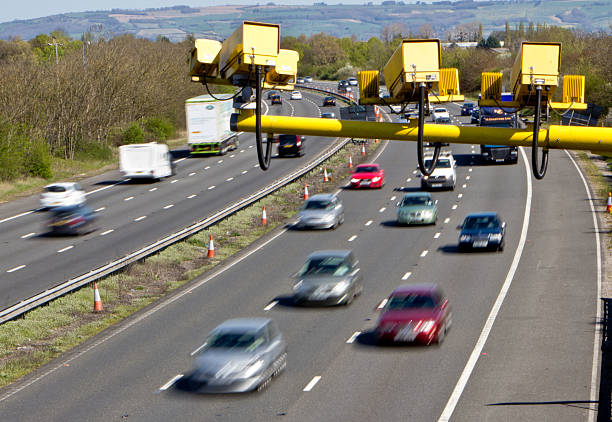Vehicle identification is a legal requirement when driving on the roads in the UK. From our number plate alone, authorities can identify who owns the vehicle and what type of vehicle it is. In the UK, the evolution of number plates from simple alphanumeric combinations to technological wonders has been remarkable, shaping not only the look of vehicles but also the efficiency of identification systems.
In this article, we are going to look at how important number plates are and the role they play when it comes to vehicle identification systems.
A Historical Peek – From Simple Plates to Smart Tags
When we look at the history of number plates, they have been seen on our roads for over a century. However, their role is to help identify vehicles and that has not changed throughout the decades.
Evolution of Designs and Materials
Reflective plates made their debut, reflecting not just light but also a shift in the concept of identification. Regional coding further nuanced the outlook, allowing for a more granular classification of vehicles. The evolution of these plates mirrored the advancements in materials and design elements, transforming them from basic markers to more intricate components of the vehicular ensemble.
Challenges Faced by Older Formats
However, progress often brings challenges. The ageing formats of these number plates encountered hurdles that needed addressing. Forgery emerged as a significant concern, undermining the reliability of these identifiers. Simultaneously, automated identification systems struggled to cope with the intricacies of older designs, necessitating a response to these growing pains.
The Call for Technological Upgrades
Recognising the limitations of the existing formats, the call for technological upgrades became evident. The clamour for a solution that could seamlessly marry tradition with innovation resonated within the corridors of the automotive space. It was at this juncture that the narrative took a turn towards technological advancements, steering these plates into the domain of smart tags.
Paving the Way for Smart Tags
The evolution from basic identification to the introduction of smart tags marked a massive shift. Technological innovation became the catalyst for a significant overhaul in the functionality and purpose of UK number plates. The infusion of smart technology not only addressed the challenges faced by the older formats but also positioned these plates as crucial components in the modern era of vehicle identification systems.
The Crucial Role in Modern Vehicle Identification Systems
In dissecting the historical journey, it becomes evident that UK number plates have transcended their initial role as mere identifiers. They have become integral to the intricate web of vehicle identification systems that govern contemporary traffic management, law enforcement, and road safety. The journey from simplicity to smartness is not just a chronological progression because it’s a testament to the adaptability and resilience of these important parts of the motor industry
The Dawn of Digital Plates: RFID and Beyond
The turning point in the journey of UK number plates arrived with the introduction of Radio Frequency Identification (RFID) technology. This technological leap ushered in a new era, steering these plates beyond their conventional roles. At the heart of this transformation lies the integration of embedded RFID chips, a small yet powerful addition that redefined the entire meaning of vehicle identification.
Unlocking RFID Technology
Embedded discreetly within the structure of the number plates, RFID chips act as silent envoys transmitting vital information when prompted by specialised readers. The beauty of this technology lies in its simplicity—a quiet revolution that drastically enhances the efficiency of vehicle identification systems. No longer confined to static identifiers, these plates now possess dynamic capabilities, interacting with the surrounding environment in real-time.
Benefits of RFID-Enabled Plates
The advantages bestowed by RFID technology are far-reaching. The most conspicuous among them is the acceleration of identification processes. The once tedious task of manually verifying number plates in various scenarios is now streamlined, contributing to a faster and more fluid traffic flow. The ripple effect extends to traffic management systems, where the ability to swiftly identify vehicles enhances overall operational efficiency.
Enhanced Traffic Flow Management
The implementation of RFID technology goes beyond the act of identification. It serves as a silent conductor orchestrating the movements of vehicles within the complex symphony of traffic. By ensuring rapid and accurate identification, RFID contributes to a harmonious flow, mitigating congestion and bottlenecks. In essence, it transforms the vehicular orchestra into a well-coordinated ensemble, each element playing its part seamlessly.
Heightened Security Measures
Security is a paramount concern in the ever-evolving world of transportation. RFID technology enhances the security posture of vehicle identification systems. By providing unique and tamper-resistant identifiers, it acts as a vigilant gatekeeper, fortifying the integrity of these plates against potential threats. The result is a robust defence mechanism, safeguarding against unauthorised access and fraudulent activities.
Beyond RFID – Exploring ANPR Technology
The evolution doesn’t halt at RFID; it extends to embrace more advanced technologies, with Automatic Number Plate Recognition (ANPR) leading the way. ANPR takes the principles of RFID a step further, incorporating sophisticated algorithms and optical character recognition to decipher number plates. This expansion broadens the horizons of what these plates can achieve, pushing the boundaries of technological integration.
Privacy Concerns and Data Protection
In embracing the convenience ushered in by technology-infused plates, an essential element that demands attention revolves around data privacy and the potential for misuse. It’s imperative to recognise and address these concerns to foster a trustworthy environment for the seamless integration of these advanced identification systems.
Dealing with Privacy Challenges
The adoption of technology in vehicle identification systems raises pertinent questions about the protection of personal data. As these plates become more than static markers, actively engaging with various systems, the need to safeguard the information they carry becomes paramount. The ease of identification and tracking, while beneficial for traffic management, necessitates a delicate approach to balance innovation with individual privacy rights.
Legal and Regulatory Safeguards
Acknowledging the sensitivity of personal data associated with tech-enabled plates, legal and regulatory frameworks have been established. These frameworks act as guardians, outlining the permissible use of the information collected through these systems. By establishing clear guidelines, they create a structured environment wherein the benefits of technology can be harnessed without compromising the privacy of individuals.
The Importance of Data Security
Best practices for data security serve as the backbone of responsible technology implementation. These practices extend beyond the mere protection of data; they ensure that every interaction involving these plates adheres to the highest standards of privacy. From secure data transmission to encrypted storage, each aspect is meticulously crafted to fortify the system against potential vulnerabilities, reinforcing the trust that individuals place in these evolving identification technologies.
Balancing Innovation and Privacy
The delicate equilibrium between innovation and privacy protection is the fulcrum on which the success of tech-enabled plates hinges. Striking this balance involves continuous scrutiny of the evolving technological space and its intersection with ethical considerations. The commitment to preserving privacy while reaping the benefits of technological advancement reflects a conscientious approach, acknowledging the dual responsibility of enhancing efficiency and safeguarding individual rights.
Ensuring Responsible Information Use
Responsibility is the cornerstone of effective data protection. Responsible information use involves not only complying with legal frameworks but going beyond to uphold ethical standards. It entails transparency in communication about data practices, empowering individuals with the knowledge of how their information is used. By fostering a culture of responsible information use, these systems contribute to the establishment of a symbiotic relationship between technology and privacy.
In delving into privacy concerns and data protection, it’s evident that the narrative surrounding tech-enabled plates is not just about innovation; it’s about responsibility. The safeguards in place, from legal frameworks to best practices, underscore the commitment to a future where advanced identification systems coexist harmoniously with the protection of individual privacy.
The Future of Vehicle Identification – What Lies Ahead?
Gazing ahead, the path of UK number plates unfolds towards integration with vehicle-to-everything (V2X) communication systems and the sharing of real-time traffic data. As these advancements beckon with promises of heightened efficiency, it becomes paramount to navigate the ethical considerations and societal implications that accompany this journey. In embracing a future where vehicle identification systems evolve into greater sophistication, striking a harmonious balance between technological progress and societal values takes centre stage.
Embracing Integration with V2X Communication Systems
The foreseeable future envisions a seamless integration of UK number plates into V2X communication systems. This leap forward holds the potential to transform how vehicles interact with each other and the surrounding infrastructure. The bidirectional communication facilitated by V2X systems not only enhances real-time traffic management but also contributes to overall road safety. It’s a shift towards a more interconnected vehicular ecosystem where information flows effortlessly, fostering a collective intelligence that benefits every road user.
Real-Time Traffic Data Sharing – A Collaborative Approach
One of the hallmarks of the ever-changing world of vehicle identification is the prospect of real-time traffic data sharing. This collaborative approach involves vehicles sharing crucial information about road conditions, congestion, and potential hazards in real time. The collective pool of data becomes a valuable resource, empowering drivers with insights to make informed decisions and aiding authorities in optimising traffic flow. The synergy between vehicles and infrastructure lays the foundation for a dynamic, responsive, and safer transportation network.
Ethical Considerations in the Spotlight
Amidst the technological strides, ethical considerations emerge as a focal point of discussion. As UK number plates become integral to intricate communication networks, questions about data ownership, consent, and responsible use come to the forefront. Balancing the advantages of streamlined traffic systems with the protection of individual privacy requires a thoughtful approach. Ethical frameworks must evolve alongside technological advancements, ensuring that the benefits are harnessed while safeguarding the rights and autonomy of individuals.
Societal Implications – Understanding the Impact
The societal implications of advancing vehicle identification systems extend beyond individual privacy. They touch upon broader aspects of how communities interact with technology and adapt to changing norms. From considerations about inclusivity in access to these technologies to their impact on traditional modes of transportation, the societal fabric undergoes shifts. Navigating these implications demands a holistic approach, involving open dialogue, community engagement, and a shared responsibility in shaping the future of transportation.
Balancing Technological Progress with Societal Values
In the journey towards a future where vehicle identification systems reach new heights of sophistication, the essence lies in striking a delicate balance. Technological progress is not an isolated pursuit; it intertwines with the values and aspirations of society. The road ahead necessitates a conscious and inclusive approach that considers the diverse perspectives and interests of the community. It’s not merely about the advancement of plates; it’s about co-creating a future where technology serves as a tool for societal well-being.
Finally
In conclusion, the journey of UK number plates from simple identifiers to technological marvels has been transformative. These plates play a pivotal role in advancing vehicle identification systems, shaping the outlook of transportation and road safety. As we look ahead, the future promises not just efficiency but a revolution in how we navigate our roads, ensuring a harmonious blend of technology and societal values.
The historical evolution, from the rudimentary plates of the early 20th century to the smart tags of today, reflects the continuous quest for improvement in identification and security. The introduction of RFID technology marked a turning point, facilitating faster identification, improved traffic management, and heightened security. The subsequent emergence of ANPR technology showcased the expanding capabilities of these systems, addressing challenges faced by older formats.
While these technological advancements bring convenience, they also raise concerns about data privacy and misuse. The implementation of legal and regulatory frameworks, along with best practices for data security, strives to strike a delicate balance between innovation and privacy protection. Looking forward, the trajectory suggests integration with V2X communication systems and real-time data sharing. However, as we embrace these advancements, it becomes imperative to navigate the ethical considerations and societal implications, ensuring a future where sophisticated vehicle identification systems align with our collective values.






